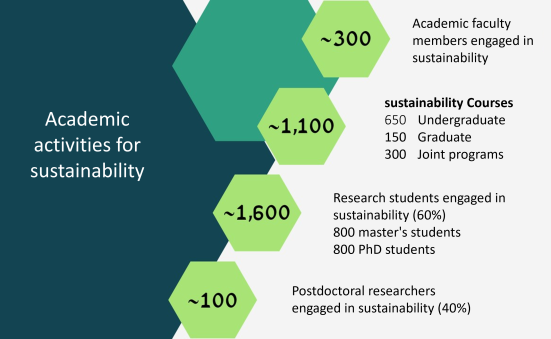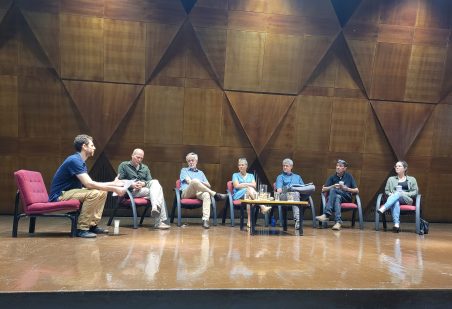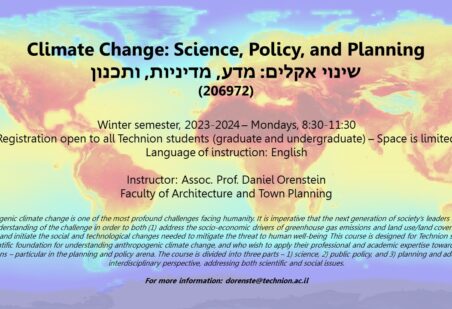Research and Education activities at the Technion have for decades included topics such as civil engineering – included in structural engineering, management and construction, transportation engineering, water engineering, environmental engineering, energy, architecture, landscape engineering, city and regional planning, materials science and engineering, chemistry and chemical engineering, industrial engineering and management, economics, performance research and optimization, biotechnology and food engineering, biology, medicine, biomedical engineering and more. All of these relate directly to the challenge of sustainability.
With the rise of global awareness on the subject of sustainability in its various shades, sustainability has naturally become the way of thinking and action that characterizes and sometimes leads researchers and lecturers in a variety of these fields – whether they are trying to find sustainable solutions to burning scientific and engineering questions in their fields and harnessing their disciplinary strengths for the benefit of these, or whether they are training the next generations of workers in the economy, who will have to deal with aspects of sustainability during their professional lives.
Therefore, most faculties at the Technion deal with sustainability – some as a research/educational focus and some as a concept that guides their current activities: at the Technion there are about 1,100 courses that deal one way or another with sustainability issues, and there are over 300 academic faculty members whose field of research belongs to sustainability in its broadest sense (according to definitions of the United Nations SDG’s).
Technion researchers are at the forefront of research in many sustainability fields and lead research collaborations with other academic groups in Israel and around the world. At the Technion, multidisciplinary and multi-faculty research centers and institutes have been established whose core business is sustainability – the largest of which are in the fields of energy and electrochemical propulsion, water, smart transportation, urban planning and research, construction and food technologies. Many researchers at the Technion are also engaged in applied research in the field, sprouting start-up companies and/or establishing branch collaborations with industry and public sector organizations in Israel and around the world.
In order to develop the topic of sustainability at the Technion in another significant step beyond all this, the Technion management chose the topic of sustainability as one of the three main development fronts of the Technion for the coming decade (as reflected in the Technion’s strategic plan 2021-2031). This front, whose establishment is planned for the coming year, will focus on issues of environment, climate, water, energy, catalysis, food, materials, urban planning and smart transportation.
The sustainability front will be a focal point for multidisciplinary cross-fertilization and synergy of various disciplinary capabilities. It will operate in a targeted and coordinated way across the Technion – also in the sense that it will a joint initiative of a large number of faculties and be multidisciplinary in nature, but also in the sense that education and training activities, research and social involvement will be incorporated under it: joint recruitment of faculty members, joint research, coordination of development directions, building strategic partnerships with industry and other organizations, setting up joint infrastructures, and activities to contribute to the community and social involvement and activities in the international arena.







